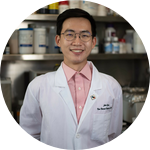About This Project
Meeting the meat demands of a growing population is increasingly difficult and is harmful to the environment, human health, and animal welfare. Cultured meat can provide a sustainable alternative. My project aims to produce plant protein fibers that can be incorporated into whole cut style cultured meat. Whole cut meat constitutes a large portion of the meat market, therefore technologies that enable whole-cut cultured meat formation are key for maximizing the impact of cultured meat.
Ask the Scientists
Join The DiscussionWhat is the context of this research?
Cultured meat presents an alternative form of meat production in which skeletal muscle and adipose cells are directly grown to form meat, instead of an entire animal. As a result, cultured meat has the potential to be more environmentally sustainable and healthier than conventionally-produced meat. However, there is a lack of technologies available to enable the production of whole cut meats despite whole cut products comprising the majority of sales in the meat market. A major obstacle in the creation of whole cut meats is the need for muscle fibers to be organized in an aligned, densely packed manner. It may be possible to address this using textile bioengineering techniques that weave or braid threads of muscle tissue into a 3D construct with an array of organized muscle fibers.
What is the significance of this project?
Textile bioengineering techniques can be applied to the production of whole cut cultured meat. Muscle cell precursors can be grown on edible protein fibers to comprise the thread that is woven 3D pieces of meat. An effective, scalable method of making thermally drawn protein fibers has been demonstrated with gelatin, however this requires animal materials and expensive equipment. This project develops thermally drawn protein fibers using non-animal derived materials, allowing for use in cultured meat. Additionally, this project highlights a low-cost method of thermally drawing the protein fibers with easily obtainable components. The project provides an accessible manner to advance research in whole cut cultured meat and increase public knowledge of cellular agriculture.
What are the goals of the project?
The project aims to replicate whole cut meat’s aligned muscle fibers in a low cost manner with muscle cells grown on plant protein fibers. This will be accomplished through design and construction of a fiber-drawing tower consisting of an electric heating element and microcontroller-automated fiber drawing. A formulation for a protein fiber compatible with thermal drawing will be developed. The device will be used for the thermal drawing of the fibers. Finally, the ability of muscle cells to grow on the drawn fibers will be tested. Presently, construction of the device has begun and some fiber preforms have already been produced. These will be further developed during the project.
Budget
The funding of this project will be used to support the costs of materials involved in producing plant-based fibers, building the fiber-drawing device, and growing cells on the fiber scaffolds. The cost associated with each budget item in the estimations can be found here.
Endorsed by
 Project Timeline
Project Timeline
The project will begin with construction of an electric heating element, microcontroller programming to automate the drawing process, and CAD design and 3D printing of parts for the fiber-drawing device. Literature reviews and testing formulations will guide the development of a recipe for a protein-based preform fiber. After operation of the thermal drawing device, growing livestock muscle satellite cells on the fibers will test their ability to provide aligned muscle fibers in whole cut meats.
Jan 25, 2022
Project Launched
Feb 10, 2022
Assemble and construct the fiber-drawing tower and program the heating elements and thread pulling components
Feb 21, 2022
Project Launched
Mar 08, 2022
Fabricate protein fiber preforms with non animal materials
Apr 01, 2022
Draw thin protein fiber scaffolds with the thermal-drawing device
Meet the Team
Affiliates
Brigid Barrick
Brigid Barrick is a third year undergrad at Tufts University studying Biomedical Engineering. Over the past two years, she has been conducting cellular agriculture research in the David Kaplan Laboratory under the guidance of PhD Candidate John Yuen. Brigid has assisted on projects involving the scaling up of in-vitro fat production, vascularization of skeletal muscle and fat in a perfusion bioreactor, and development of non-animal based scaffolds with increased binding ability. Brigid is interested in building upon cultured meat concepts in developing a low-cost, accessible method to produce whole cut cultured meat.
Brigid is co-authored with John and Dr. Kaplan on a review paper on adipose tissue engineering for food applications and is currently preparing a primary research paper on scalable cell-cultured fat tissue.
John Yuen
John Yuen is a 5th year Bioengineering PhD Candidate in the David Kaplan Laboratory at Tufts University with a prior background in molecular biology and bone biochemistry research at the University of California, San Diego. At Tufts, John works on methods to produce bulk muscle and fat tissues for food and cultured meat applications. These methods include the development of dual-approach bioreactors that combine conventional macroscale channels with tissue vascularization techniques to form a comprehensive tissue perfusion strategy that enables volume efficient engineering of large tissues. John also works on bottom-up approaches to form large tissues using small tissue fragments, specifically for low cost, scalable cultured fat production.
David L Kaplan
David Kaplan is the Stern Family Endowed Professor of Engineering at Tufts University, a Distinguished University Professor, and Professor and Chair of the Department of Biomedical Engineering. He also holds faculty appointments in the departments of Chemical and Biological Engineering, Chemistry, Biology and in the School of Medicine. His research focus is on biopolymer engineering, tissue engineering, regenerative medicine and cellular agriculture. He has published over 1,000 peer reviewed papers, is editor-in-chief of ACS Biomaterials Science and Engineering and he serves on many editorial boards and programs for journals and universities. He has received awards for his research and teaching and is an elected Fellow of the American Institute of Medical and Biological Engineering and the National Academy of Engineering.
Project Backers
- 10Backers
- 103%Funded
- $1,788Total Donations
- $178.80Average Donation



